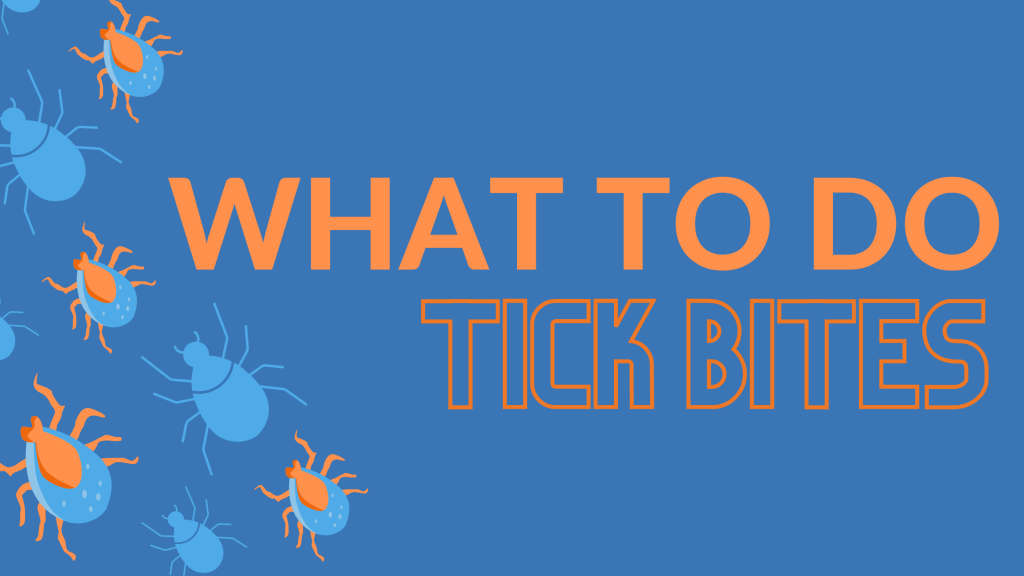What To Do After A Tick Bite

If you’ve spent any time outdoors this summer, you’ve likely encountered ticks at some point. The little pests are very common in Ohio and are attracted to people and our four-legged friends. They live outdoors in tall grass, trees, bushes, and leaf piles. While tick bites themselves are relatively harmless, it’s the diseases that ticks carry onto us that can be incredibly dangerous and deadly. Here’s what you need to know about ticks and what you need to do after a tick bite.
What Do Ticks Look Like?
Ticks are relatively small, blood-feeding bugs. They can be as tiny as the head of a pin or as large as a pencil eraser. They range in color from red to brown to black.
If you’ve caught a tick on yourself early enough, it likely won’t be too large. As ticks take in more blood from their host, they swell up in size and can get to be as large as the size of a marble.
Where Is The Tick Likely To Attach Itself?
Ticks enjoy the warm, moist areas of the human body, which means they’re likely to be found around your armpits, groin, and hair.
Unlike other biting bugs, ticks don’t just bite and leave. Instead they remain attached to your body after they bite. Ticks can spend up to 10 days feeding on you before they detach themselves and fall off.
So You’ve Found A Tick On Yourself, Now What?
Remove the tick ASAP!
- Use a pair of sanitized fine-tipped tweezers to grasp the tick as close to your skin as possible.
- Once you have a firm hold on the tick with your tweezers, pull upward with steady, even pressure. DO NOT twist or jerk the tick off, to avoid the head becoming detached and embedded in your skin!
- After removing the tick, clean the area and your hands with rubbing alcohol or soap and water.
- If the tick has been on you for less than 6 hours, dispose of the tick by flushing it down the toilet.
If you’re unsure of how long the tick was attached to you, you may want to preserve the specimen for your physician to evaluate. Put the tick on a cotton pad of rubbing alcohol and place it in a sealed bag or container.
When To See A Doctor After a Tick Bite
If you develop any of the following symptoms, days or weeks after getting bit by a tick, it’s time to see a doctor for a physical evaluation and possible antibiotic treatment for Lyme disease.
Symptoms that may develop within 3-30 days after a tick bite:
- Headache
- Fever
- Chills
- Unusual Fatigue
- Muscle and/or Joint Aches
- A red, expanding rash that looks similar to a bullseye pattern, which will often occur at the site of the tick bite
Note: Between 70-80% of people with Lyme infection will develop the signature bullseye pattern rash so if you notice that, definitely visit a doctor ASAP.
Symptoms that may develop days to weeks after a tick bite:
- Nerve pain or numbness
- Weakness/paralysis of facial muscles
- Heart palpitations, chest pain, or other heart issues
- Shortness of breath
- Dizziness, lightheadedness, or fainting
Symptoms that may develop months to years after a tick bite:
- Joint pain and swelling
- Muscle weakness
- Numbness and tingling
- Speech problems
- Memory or cognitive issues
How You Can Prevent Tick Bites and Eliminate The Risk Of Infection
If you’re an outdoorsy person, it’s best to be proactive when it comes to avoiding tick-borne disease. Here are a few things you can do to prevent a tick from latching onto you and causing illness.
- Wear long sleeves and pants when walking out in the woods or out in grassy areas, places where ticks are likely to be hiding among the foliage
- Walk directly in the center of trails
- Use tick repellent with at least 20% DEET
- Treat your clothing and hiking or camping gear with 0.5% permethrin
- After being outdoors, take a shower or bath within 2 hours of coming back inside to catch ticks early
- Check skin closely after being in tick infested areas. Do a through inspection of your arms, behind your ears, between your legs, behind your knees, and throughout your hair.
It usually takes over 24 hours of feeding for a disease-carrying tick to infect you so the sooner you find and remove a tick from your body, the better!
If you have any questions or concerns about ticks, give the exterminating experts at Go2Pros a call today! We’ll provide you answers and put your mind at ease.
